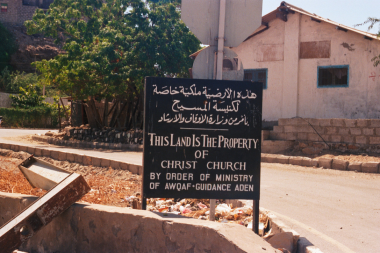Yemen crisis: Conditions in Aden are 'terrible', says Anglican bishop

Conditions in the Yemeni city of Aden are "terrible", according to the Anglican Bishop of Cyprus and the Gulf, with scarcities of basic commodities and widespread destruction.
More than 600 people have been killed in the city and 3,000 wounded, while 22,000 residents had been displaced since the Iran-backed Houthi rebels first pushed into the city on March 25.
Fighting in the city has seen damage to the city's Christ Church and its associated clinic, Ras Morbat.
Rt Rev Michael Lewis wrote in a prayer letter that the buildings' windows had been blown out as a result of blast waves from sustained shelling. However, he added, "we are told that all our staff are safe so far, and for that we thank God".
He said: "The general state of Aden is terrible: lack of fuel means lack of electricity, and telecommunications and even basic movement around the large city have become hugely difficult. Food is limited, and money to buy it even more so.
"Our administrator is very thankful for the many prayers that he knows have been made for him, for all who work at Ras Morbat, and for the people of Aden and the Yemen as a whole, a country sorely abused by those with the power, if they chose to use, to promote the common good to the glory of God."
A five-day truce appeared to be broadly holding yesterday, despite reports of air strikes overnight by Saudi-led forces and continued military activity by the Houthis. Witnesses in the southwestern city of Abyan said warplanes had hit positions there after the Houthi seized the area following the start late on Tuesday of the ceasefire, which is intended to ward off a humanitarian catastrophe.
Residents of the southern provinces of Shabwa and Lahj, which have witnessed heavy ground clashes between local militiamen and the Houthis, also reported air strikes overnight.
Saudi Arabia and the Houthis traded accusations of ceasefire violations along the mountainous Yemeni-Saudi border, but residents said hostilities appeared to have largely died down.
An alliance of Gulf Arab nations has been bombing Houthi militia and allied army units that control much of the country since March 26 in what they say is an attempt to restore exiled President Abd-Rabbu Mansour Hadi.
Saudi Arabia and its Sunni Muslim allies believe the Houthis are a proxy for the influence of their arch-rival, Shi'ite Iran, in a regional power struggle that has helped exacerbate sectarian tensions across the Middle East.
Aid agencies said the five-day break in fighting to allow fuel, medicine, food and aid workers to enter Yemen could be a "lifeline" for civilians trapped in conflict zones.
The United Nations believes 828 civilians, including 182 children, have been killed across Yemen since March 26.
Aden locals expressed doubts that the ceasefire would last.
"Aden needs a humanitarian truce so badly, given the lack of food, fuel and everything else. But we question the intentions of the Houthis and believe they will take advantage of the truce to take more areas," said Hassan al-Jamal, a resident of Aden.
Additional reporting by Reuters.











